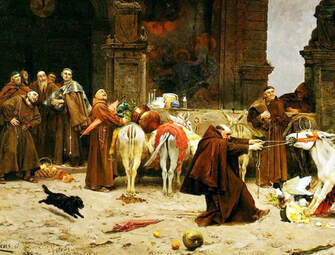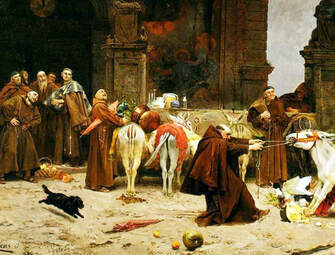About Our Philosophy
|
The cornerstone of the F.B.I. Team's philosophy is the concept of εὐτραπελία (eutrapelia). Read the following essay to learn more...
|
The following piece originally appeared in The National Catholic Register. It is reprinted here with permission.
We Need More Eutrapelia!
Aristotle and Aquinas on the Virtue of Play
by Kathy Schiffer
 Eduardo Zamacois y Zabala, “Taming the Donkey,” 1868.
Eduardo Zamacois y Zabala, “Taming the Donkey,” 1868.
All work and no play makes Jack a dull boy. The origin of that old proverb is unclear, but it appeared in print as early as 1659, when Anglo-Welsh historian and writer James Howell included it in his comprehensive text Proverbs in English, Italian, French and Spanish.
The proverb refers to eutrapelia, a Greek term meaning “ready wit” or “pleasantness in conversation.” In his Nicomachean Ethics (4.8), Aristotle included eutrapelia as one of his virtues – the “golden mean” between boorishness and buffoonery. St. Thomas Aquinas seemed to have Aristotle's version in mind when he included eutrapelia in his scheme of virtues under the potential parts of temperance. But it's not always seen as virtuous; in fact, eutrapelia sometimes signifies jokes that are obscene and coarse. It's that latter sense of “eutrapelia as obscenity” that appears in the New Testament, in Ephesians 5:4:
The proverb refers to eutrapelia, a Greek term meaning “ready wit” or “pleasantness in conversation.” In his Nicomachean Ethics (4.8), Aristotle included eutrapelia as one of his virtues – the “golden mean” between boorishness and buffoonery. St. Thomas Aquinas seemed to have Aristotle's version in mind when he included eutrapelia in his scheme of virtues under the potential parts of temperance. But it's not always seen as virtuous; in fact, eutrapelia sometimes signifies jokes that are obscene and coarse. It's that latter sense of “eutrapelia as obscenity” that appears in the New Testament, in Ephesians 5:4:
Entirely out of place is obscene, silly, and vulgar talk; but instead, let there be thanksgiving. (New Revised Standard Version)
And there must be no filthiness and silly talk, or coarse jesting, which are not fitting, but rather giving of thanks. (New American Standard Version)
But eutrapelia, in the positive sense in which Aristotle and later St. Thomas Aquinas intended it, is not just dirty jokes – but rather, the virtue of pleasantness or playfulness. Brother Joseph-Anthony Kress, O.P., writing in the journal Dominica, applied the virtue of eutrapelia to his favorite sport, soccer:
Following Aristotle, St. Thomas Aquinas assigns to games the virtue of eutrapelia. This is the virtue of pleasantness or playfulness. St. Thomas explains that, just as the body needs rest when it is weary, so too does the soul when it becomes overburdened. And, like the body, the soul takes rest in a kind of pleasure, which we call “play.” As St. Thomas says, “Now such like words or deeds wherein nothing further is sought than the soul’s delight are called playful or humorous.” Of course, these words or deeds are only virtuous if they accord with reason. Playfulness has its proper time, place, and mode. But insofar as we play reasonably, we can speak of a virtue of playfulness and, therefore, a virtue related to games. Through games we restore the strength of our souls, so as to be more fervent in pursuing higher ends, such as contemplation.
All of this is to say, we need a little more eutrapelia around here! In this highly politicized era, social media has become toxic. Facebook users have attacked one another with word bombs and memes, prompting Mark Zuckerberg to pledge to combat “hate speech” and misinformation on his platform. Often we have allowed our disagreements to define us, and that has boiled over into intolerance and division, name calling and cheap shots. Liberal protesters have hurled insults at the President of the United States and the First Lady. During the nomination process for Supreme Court Justice Brett Kavanaugh, USA Today was forced to apologize for its unfortunate headline, inferring that Kavanaugh was a “sexual predator” who “should stay away from basketball courts when kids are around.” Game show host Pat Sajak, whose Twitter account is rich with humor and political commentary, tweeted this:
Twitter is filled with people who will go to bed enraged tonight and wake up enraged in the morning. Kind of sad, really. This was supposed to be fun.
A Better Way
But we are God's people! Instead of hurling insults against insults, Christ challenges us to be people of mercy and compassion, tolerance and hope. That old “turn the other cheek” admonition in Matthew 5:38-40 – are we doing that? Are we looking at The Other through Christ's eyes?
A wise mom noted that we expend a lot of energy teaching our children how sacred our sexuality is, in part because it is the means by which new souls are brought into the world. Why, she asked, don't we also impress upon them how holy speech is? After all, God spoke Creation into being and pronounced it good. Our words should nurture souls, even badly broken and sinful ones – not demean and destroy them.
A friend commented recently on social media, mourning the lack in our online manners. He quoted the prophet Moses, who exclaimed, “Would that all the people of the LORD were prophets! Would that the LORD might bestow his spirit on them all!” The fact is, by our baptism, we are called to live as prophets of God's abiding mercy and love and witnesses of the Gospel.
How can we do that better in our troubled, divided, cynical, politically charged age? Well, by exercising the virtue of eutrapelia!
But we are God's people! Instead of hurling insults against insults, Christ challenges us to be people of mercy and compassion, tolerance and hope. That old “turn the other cheek” admonition in Matthew 5:38-40 – are we doing that? Are we looking at The Other through Christ's eyes?
A wise mom noted that we expend a lot of energy teaching our children how sacred our sexuality is, in part because it is the means by which new souls are brought into the world. Why, she asked, don't we also impress upon them how holy speech is? After all, God spoke Creation into being and pronounced it good. Our words should nurture souls, even badly broken and sinful ones – not demean and destroy them.
A friend commented recently on social media, mourning the lack in our online manners. He quoted the prophet Moses, who exclaimed, “Would that all the people of the LORD were prophets! Would that the LORD might bestow his spirit on them all!” The fact is, by our baptism, we are called to live as prophets of God's abiding mercy and love and witnesses of the Gospel.
How can we do that better in our troubled, divided, cynical, politically charged age? Well, by exercising the virtue of eutrapelia!
The cornerstone of the F.B.I. Team's philosophy is the concept of εὐτραπελία (eutrapelia). Read the following essay to learn more...
The following piece originally appeared in The National Catholic Register. It is reprinted here with permission.
We Need More Eutrapelia!
Aristotle and Aquinas on the Virtue of Play
by Kathy Schiffer
 Eduardo Zamacois y Zabala, “Taming the Donkey,” 1868.
Eduardo Zamacois y Zabala, “Taming the Donkey,” 1868.
All work and no play makes Jack a dull boy. The origin of that old proverb is unclear, but it appeared in print as early as 1659, when Anglo-Welsh historian and writer James Howell included it in his comprehensive text Proverbs in English, Italian, French and Spanish.
The proverb refers to eutrapelia, a Greek term meaning “ready wit” or “pleasantness in conversation.” In his Nicomachean Ethics (4.8), Aristotle included eutrapelia as one of his virtues – the “golden mean” between boorishness and buffoonery. St. Thomas Aquinas seemed to have Aristotle's version in mind when he included eutrapelia in his scheme of virtues under the potential parts of temperance. But it's not always seen as virtuous; in fact, eutrapelia sometimes signifies jokes that are obscene and coarse. It's that latter sense of “eutrapelia as obscenity” that appears in the New Testament, in Ephesians 5:4:
The proverb refers to eutrapelia, a Greek term meaning “ready wit” or “pleasantness in conversation.” In his Nicomachean Ethics (4.8), Aristotle included eutrapelia as one of his virtues – the “golden mean” between boorishness and buffoonery. St. Thomas Aquinas seemed to have Aristotle's version in mind when he included eutrapelia in his scheme of virtues under the potential parts of temperance. But it's not always seen as virtuous; in fact, eutrapelia sometimes signifies jokes that are obscene and coarse. It's that latter sense of “eutrapelia as obscenity” that appears in the New Testament, in Ephesians 5:4:
Entirely out of place is obscene, silly, and vulgar talk; but instead, let there be thanksgiving. (New Revised Standard Version)
And there must be no filthiness and silly talk, or coarse jesting, which are not fitting, but rather giving of thanks. (New American Standard Version)
But eutrapelia, in the positive sense in which Aristotle and later St. Thomas Aquinas intended it, is not just dirty jokes – but rather, the virtue of pleasantness or playfulness. Brother Joseph-Anthony Kress, O.P., writing in the journal Dominica, applied the virtue of eutrapelia to his favorite sport, soccer:
Following Aristotle, St. Thomas Aquinas assigns to games the virtue of eutrapelia. This is the virtue of pleasantness or playfulness. St. Thomas explains that, just as the body needs rest when it is weary, so too does the soul when it becomes overburdened. And, like the body, the soul takes rest in a kind of pleasure, which we call “play.” As St. Thomas says, “Now such like words or deeds wherein nothing further is sought than the soul’s delight are called playful or humorous.” Of course, these words or deeds are only virtuous if they accord with reason. Playfulness has its proper time, place, and mode. But insofar as we play reasonably, we can speak of a virtue of playfulness and, therefore, a virtue related to games. Through games we restore the strength of our souls, so as to be more fervent in pursuing higher ends, such as contemplation.
All of this is to say, we need a little more eutrapelia around here! In this highly politicized era, social media has become toxic. Facebook users have attacked one another with word bombs and memes, prompting Mark Zuckerberg to pledge to combat “hate speech” and misinformation on his platform. Often we have allowed our disagreements to define us, and that has boiled over into intolerance and division, name calling and cheap shots. Liberal protesters have hurled insults at the President of the United States and the First Lady. During the nomination process for Supreme Court Justice Brett Kavanaugh, USA Today was forced to apologize for its unfortunate headline, inferring that Kavanaugh was a “sexual predator” who “should stay away from basketball courts when kids are around.” Game show host Pat Sajak, whose Twitter account is rich with humor and political commentary, tweeted this:
Twitter is filled with people who will go to bed enraged tonight and wake up enraged in the morning. Kind of sad, really. This was supposed to be fun.
A Better Way
But we are God's people! Instead of hurling insults against insults, Christ challenges us to be people of mercy and compassion, tolerance and hope. That old “turn the other cheek” admonition in Matthew 5:38-40 – are we doing that? Are we looking at The Other through Christ's eyes?
A wise mom noted that we expend a lot of energy teaching our children how sacred our sexuality is, in part because it is the means by which new souls are brought into the world. Why, she asked, don't we also impress upon them how holy speech is? After all, God spoke Creation into being and pronounced it good. Our words should nurture souls, even badly broken and sinful ones – not demean and destroy them.
A friend commented recently on social media, mourning the lack in our online manners. He quoted the prophet Moses, who exclaimed, “Would that all the people of the LORD were prophets! Would that the LORD might bestow his spirit on them all!” The fact is, by our baptism, we are called to live as prophets of God's abiding mercy and love and witnesses of the Gospel.
How can we do that better in our troubled, divided, cynical, politically charged age? Well, by exercising the virtue of eutrapelia!
A wise mom noted that we expend a lot of energy teaching our children how sacred our sexuality is, in part because it is the means by which new souls are brought into the world. Why, she asked, don't we also impress upon them how holy speech is? After all, God spoke Creation into being and pronounced it good. Our words should nurture souls, even badly broken and sinful ones – not demean and destroy them.
A friend commented recently on social media, mourning the lack in our online manners. He quoted the prophet Moses, who exclaimed, “Would that all the people of the LORD were prophets! Would that the LORD might bestow his spirit on them all!” The fact is, by our baptism, we are called to live as prophets of God's abiding mercy and love and witnesses of the Gospel.
How can we do that better in our troubled, divided, cynical, politically charged age? Well, by exercising the virtue of eutrapelia!

Kathy Schiffer is a Catholic blogger. In addition to her blog Seasons of Grace, her articles have appeared in the National Catholic Register, Aleteia, Zenit, the Michigan Catholic, Legatus Magazine, and other Catholic publications. She’s worked for Catholic and other Christian ministries since 1988, as radio producer, director of special events and media relations coordinator. Kathy and her husband, Deacon Jerry Schiffer, have three adult children.
Want to learn more about eutrapelia? Check out these other resources:
- St. Thomas Aquinas, Summa Theologiae II-II, Q. 168, Art. 2: "Whether there can be a virtue about games?"
- Br. Joseph-Anthony Kress, O.P., "Eutrapelia: Pleasure for the Soul," Dominicana [Online].
